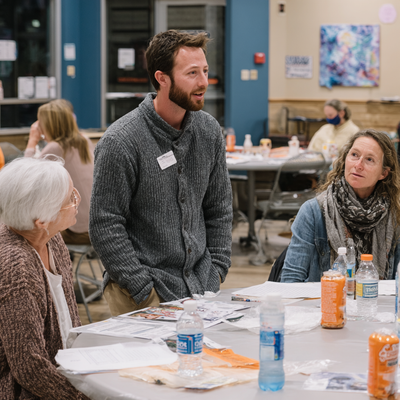So Sarah comes up to me after service Sunday and she's got this look. You know that look when someone's been chewing on something for weeks?
"I think I need to take a break."
My stomach just drops through the floor. Sarah's been doing our 4th and 5th graders for two years. Not just showing up - she IS that group. Kids literally ask where Sarah is if she's not there. Parents specifically check if she'll be around that week. I probably depend on her way more than I should.
"What's going on?" I'm thinking work got crazy or family emergency or something.
But no. She tells me she feels completely invisible. Like she's just another body so I don't have to worry about ratios. Doesn't feel connected to anyone else. Doesn't even know if anything she does matters.
Felt like someone punched me in the gut. Here I am thinking everything's running smooth and Sarah's been feeling like she doesn't exist for who knows how long.
Made me realize how badly I've been messing this up. Just assuming people know they're important without ever actually saying it. Taking them for granted because they keep showing up.
Got me thinking about what actually keeps people around versus what makes them quietly fade away. Honestly not what I expected at all.
Tell People They Actually Matter
This is gonna sound so dumb but I was totally bombing at this.
When's the last time you looked a volunteer dead in the eye and said "I'm so glad you're here. These kids love you. I literally couldn't do this without you."
For me? I honestly couldn't remember. That's how bad it was.
You get so caught up trying to survive Sunday morning chaos you forget these are actual humans who chose to spend their time helping instead of sleeping in. Like they should magically know they're appreciated because they haven't quit yet.
Completely wrong.
Started making myself thank at least one volunteer every Sunday. Not generic "thanks for helping" as they're leaving. Real specific stuff. Told Sarah "Did you see Emma's face when you asked about her sick grandma? She was still talking about it in the car."
People need to know their work matters to someone. That somebody's actually paying attention to the little things they do.
Sarah told me later she'd been wondering if I even noticed when she was there versus when she wasn't. Like maybe volunteers were just interchangeable pieces to me.
That hurt but it was probably true.
Stop Dumping Everything on Good People
This was my other massive screwup. Sarah was so reliable I kept piling more stuff on her.
Could you help with VBS? Cover for Jessica? Handle this new thing I just thought of?
She said yes every time because that's who she is. But I was slowly killing her enthusiasm by treating her like she existed to solve my problems.
These people have real jobs. Families. Their own stuff. If you act like their whole purpose is filling your gaps they'll burn out.
Had to learn to say no for them. "I know you'd be amazing at this but you're already doing so much. Let me find someone else."
Few years back had volunteer who kept saying yes to everything until she broke down crying in our supply closet. Sobbing because she felt like she was failing everyone but couldn't keep up.
Never want that again. Now I watch for when someone's getting overwhelmed even if they won't say it.
Help Them Connect with Each Other
Sarah also felt totally disconnected from other volunteers. Just doing her own thing without relationships.
Realized I never helped volunteers actually get to know each other as people. They'd work together during service but zero chances to connect beyond that.
Started volunteer breakfasts every couple months. Nothing fancy - bagels and coffee before service. Time to talk about their lives instead of just coordinating tasks.
Also made group text that's not about scheduling. Just encouragement and funny kid stories. Amazing how much community that builds.
Mike shared picture of his daughter in old VBS shirt and everyone started sharing memories. Those moments matter more than any team building thing I could plan.
People stick around when they belong somewhere not just when they're filling slots.
Let Them Actually Contribute Ideas
Volunteers who feel like they're just following orders don't stay long. They want to contribute ideas and have some say.
Started asking what they think about stuff. "That craft was disaster. What would you do different?" "What do these kids really need to learn?"
Then actually letting them run with ideas instead of nodding and doing whatever I wanted anyway.
Mike suggested outdoor activities for older kids since they get antsy inside. Instead of just saying "nice idea" I let him plan whole lesson around outdoor Bible stories. Kids loved it and he felt like real partner.
Jessica came up with kids writing letters to nursing home after hearing about loneliness issues. Totally her idea. Made huge difference. She felt like she was contributing something real.
Care About Them as Actual People
I was treating volunteers like they existed just to serve ministry needs. Never thought about what they wanted to learn or grow in.
Started asking "What's something you'd like to get better at?" or "Any part of ministry you wish you understood more?"
Jessica always wanted to learn leading worship with kids but was scared to ask. Had her shadow our worship leader and now she does it herself.
When you invest in volunteers as people with goals they stick around because they're growing too not just giving constantly.
Tom wanted to understand lesson planning better. Showed him how I work through curriculum. Now he helps plan instead of just showing up to do whatever I decided.
Don't Pretend Everything's Perfect
Used to try making everything look great so volunteers wouldn't get discouraged.
Huge mistake.
When stuff goes wrong - and it always does - be honest. "That was complete mess. Kids were checked out and I could tell you were struggling. What happened?"
Volunteers can tell when things aren't working. Pretending everything's fine makes them feel like their observations don't matter.
Plus being honest about problems makes volunteers feel trusted to help solve them instead of just smiling and going along.
Had Sunday where everything fell apart. Projector died. Supplies missing. Two volunteers called sick. Instead of acting like I had it handled I said "This is chaos but we'll figure it out."
Volunteers immediately jumped in problem solving. Felt like actual team instead of them following my panic.
Be Clear But Give Grace for Life
Volunteers need to know expectations but also room to be human.
Used to get visibly annoyed when someone was few minutes late or had to leave early. Made people feel like failures if they couldn't be perfect.
Now I'm clear about what I need but flexible how we make it work. "Really need someone for crafts but if you're late just jump in wherever helps."
Life happens. Kids get sick. Cars break. Jobs get demanding. Volunteers who feel like they have to choose between life and church will choose life.
Had volunteer whose mom got sick needed to miss weeks. Instead of guilt I said "Family first. We'll manage. Come back when ready." She's been more committed since than before.
Put People Where They Actually Fit
Nothing kills enthusiasm faster than being stuck doing stuff you hate or suck at.
Sarah's creative and amazing one-on-one with kids. But I kept putting her on crowd control because I needed someone organized.
Tom loves logistics but I had him leading discussions which made him miserable.
Started paying attention to what people are good at and enjoy. Matching roles to people instead of filling spots.
Game changer. When people use real gifts they don't just survive - they thrive.
Now I always ask new volunteers what they love and what they're good at before assigning anything. Everyone's happier.
What Doesn't Actually Work
Formal appreciation events and fancy recognition? Nice but not what keeps people long term.
Perfect training and detailed job descriptions? Helpful but not the main thing.
Volunteers stay when they feel valued and connected and like they're making difference. When someone notices their work and cares about them as people.
Fancy stuff is decoration. Relationship stuff is what matters.
Tried volunteer of month thing. Nobody cared. But personal thank you notes mentioning specific things I saw? Those they keep forever.
What I'm Doing Different
Real conversations with volunteers that aren't evaluations. Just checking how things are going and what they need.
Watching for burnout signs before people hit the wall. Protecting their time even when they won't.
Making sure new volunteers connect with others right away instead of figuring relationships out alone.
Way more intentional matching gifts and interests to what I'm asking them to do.
Remembering volunteers are whole people with lives beyond Sunday morning.
Sarah Stayed
Had long honest talk about feeling unappreciated and disconnected. Apologized for taking her for granted. Asked what would help her feel valued.
She decided to try again. But only because I was willing to actually change how I handle relationships.
Could have lost her forever if I'd brushed off her concerns or made promises I wouldn't keep.
Now she helps welcome and train new volunteers because she feels invested in others having better experience.
Why People Really Leave
Volunteers don't quit because work is hard. They quit because they don't feel like anyone cares about them.
They leave because they feel taken for granted or burned out or isolated or like they're just filling spot instead of contributing something meaningful.
Places that keep volunteers long term invest in relationships not just systems.
Takes more time and energy than filling slots with bodies. But volunteers who feel valued and connected stick around years instead of quietly disappearing after months.
Worth every bit of effort when you're not constantly scrambling to replace people who just stopped showing up.
Almost lost Sarah and other good people because I didn't get this. Don't want anyone else learning it the hard way.








